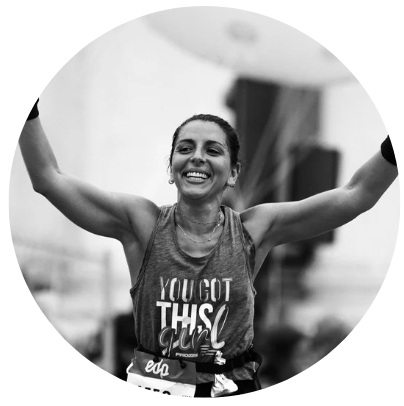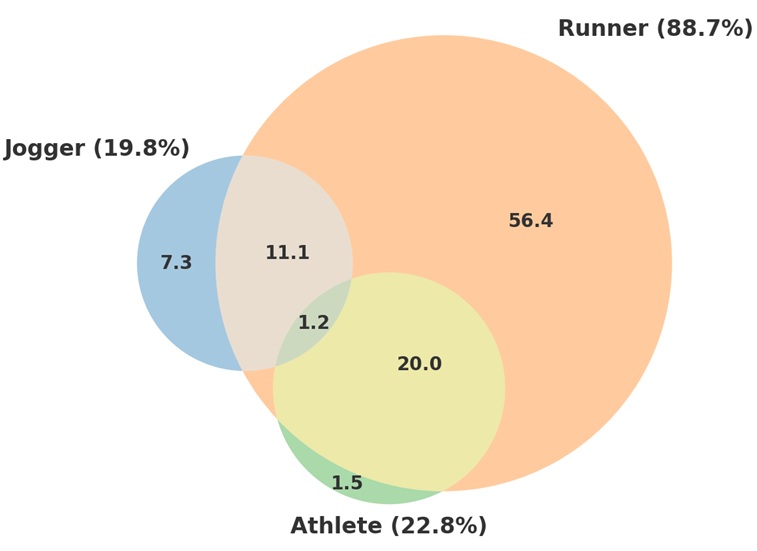Running Experience Survey 2025
1: Respondent characteristics
The Running Experience Survey (RXS) was distributed to running clubs, groups and communities, and promoted via email and social media during summer 2025.
In total, 2112 responses were received via an online questionnaire.
On this page you can see some summary statistics that describe the types of people who responded to the survey, as well initial insights into their practical and psychological relationships with running.

1.1 Demographics
Gender balance
Female runners make up a narrow majority of respondents.
This may reflect women’s generally greater willingness to complete surveys (across many contexts), and possibly their higher level of club membership – club members are over-represented in the data.
In fact, according to Sport England’s national data, males make up about 52% of runners, based on any participation over the last 12 months.
Age groups
This chart shows the proportion of survey respondents in different age groups.
The low response rate among the youngest age groups is a common issues with many surveys.
According to national surveys, running participation rates are in fact relatively stable through the first four age bands, with a steady decline for runners age 55+.
Occupational status
The majority of respondent work full-time.
There are few students in the data, almost entirely due to low response rates among young people. A common challenge for survey research!
Geography
Responses were received from right across the UK. Top contributors were:
- Northumberland
- Devon
- Suffolk
- East Sussex
- Staffordshire
And an honourable mention to Northern Ireland, whose 51 responses I’m afraid don’t appear on the map!
Hover over the map to find the number of respondents from your area.
1.2 Running characteristics
Running experience
This chart shows the number of years of running experience survey participants reported.
The raw data (in pale blue) is very bumpy, seemingly because people were rounding to the nearest 5 or 10 years.
I have added a trendline (in orange) to manage the effects of this rounding, and to show the general shape of the curve.
It is noticeable that relatively few people reported one year of running experience or less. This probably reflects the fact that the majority of respondents were running club members – a group that tend to be longer-term runners on average.
Club and community membership
As mentioned above, the majority of respondents were attached to a running club or group of some kind. This is a reflection of the sampling strategy, which relied on outreach through running clubs to find survey participants.
For comparison, Sport England’s national survey suggests that only about 18% of runners are club members.
Racing frequency
We asked how many races respondents had taken part in over the last 12 months. The most common response was three to seven races.
Very few responded ‘none’: As the survey was billed as focusing on racing experiences, few non-racers decided to take part.
1.3 Running identities
Perceived ability as a runner
This chart shows the proportion of male and female respondents who rated themselves as having different levels of running ability compared to other people of their own gender and age.
Logically, there should be roughly equal proportions of male and female runners who see themselves as above or below average. But far fewer women rated themselves as good runners than men.
About 40% of women reported seeing themselves as above average, which seems a plausible proportion. Among men, however, almost 70% saw themselves as better than average. Is this a case of male over-confidence?
Possibly – but not entirely. The sample is, after all, primarily made up of club runners, a self-selecting group that, on average, includes more above average runners than the general population.
(For comparison, among non-club runners, only 33% of women and 50% of men rated themselves as above average.)
Jogger, runner or athlete?
And finally, here are two charts that show (a) the proportions of respondents who identified ‘quite a lot’ or ‘very strongly’ with the labels, jogger, runner and athlete, and (b) the proportion of male and female runners putting themselves in each category.
Runners could choose to identify with more than one category.

Running Experience Survey
© Neil Baxter 2025
Please always cite using: Baxter, N. (2025). Running Experience Survey. Running Studies. https://runningstudies.co.uk/running-experience-survey